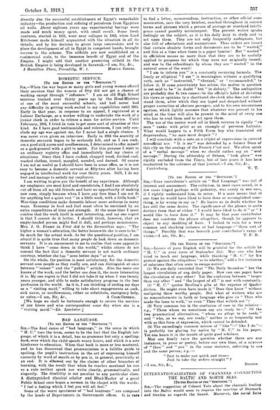[To THE EDITOR OF THE "SPECTATOR."] Sat.—Lovers of pure English
will he grateful for the article by "H. C." in your issue of September 21st. May one who has tried to teach our language, while thanking "H. C." for his protest against the ubiquitous "as to whether," add a few instances of solecisms that often seem to escape notice?
(1) We are daily reminded that "The Daily So-and-so" has the largest circulation of any daily paper. How can one paper have the circulation of any other? Yet the confusion between "larger than any other" and "the largest of all" is met with constantly.
(2) "H. C." quotes Sterling's gibe at the expense of Quaker diction. He might even have made it "Does thee know" without maligning those worthy people. But what of writers who are no nonconformists in faith or language who give us "Thou who made the lame to walk," or even "Thou that willeth not "?
(3) Very common too is the confusion of case in the relative- e.g., "Those whom we sometimes say are ready to—." Of the two grammatical alternatives, "whom we allege to be ready " and "who, as we say, are ready," neither is so frequently met with as this form of expression, which cannot be defended.
(4) The exceedingly common misuse of "like "—" like I do "- is probably too glaring for notice by "H. C." in his paper. Yet one hears it in the mouth of quite good scholars.
May one finally raise the question whether there are any instances, in prose or poetry, before our own time, of a mixture of "thou" and " you " in the same sentence, referring to owe and the same person; e.g.:- "Just to make you quick and true—
Just to take thy orders straight " P


































 Previous page
Previous page